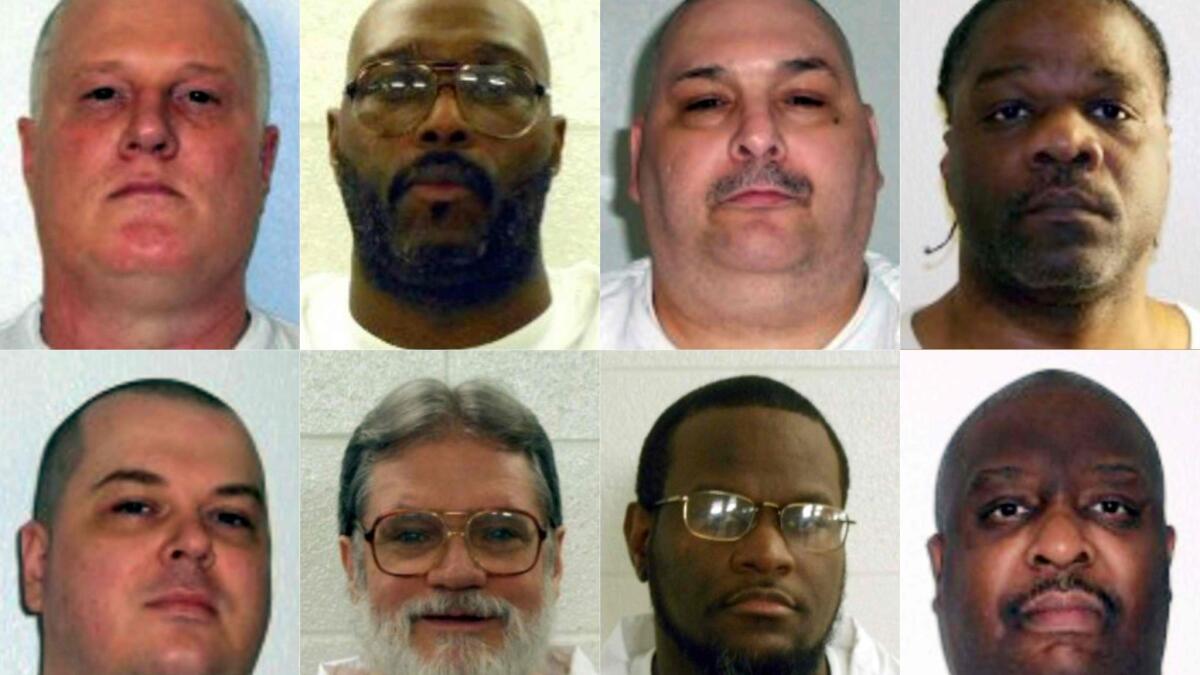Opinion: Arkansas’ rush to kill runs aground — fortunately

Arkansas’ effort to jam eight executions into 11 days is rapidly collapsing under waves of legal challenges and court rulings that spotlight the absurdities of the system itself. The latest and broadest ruling: Arkansas can’t use one of the drugs in its three-drug protocol because state officials misled the supplier about why they wanted the drug.
Instead of treating patients, the state wanted to use the drug to kill people. Had McKesson Corp., the distributor, known that, it argued in court, it never would have sold Arkansas the drug. And once it found out, McKesson struck a deal with Arkansas for a refund and the return of the drugs. But Arkansas reneged.
You have to wonder about the moral foundation of government actions — in this case, executions — when the government has to lie to accomplish them.
Given how fast and furious the court filings and rulings have flown, odds are good that another court decision will change the story line. Most of the planned executions face individual legal challenges over specifics of a case, or are part of group challenges arguing that such an accelerated schedule increases the chances for errors and botched executions, and that the sedative midazolam does not render the condemned insensate and thus exposes them to unconstitutional risks of pain and suffering.
Why the rush? Because the state’s stash of midazolam expires at the end of the month, and given the opposition by pharmaceutical companies and distributors to supplying execution drugs, Arkansas understandably believes it would have trouble finding a source to replace the drugs. So the race to execute is predicated upon a bureaucratic problem, not to further justice (and no, an execution is not justice).
Jamming the calendar has challenged the condemned men’s legal teams’ abilities to ensure constitutional rights are observed. So far, though, they seem to have met the challenge, and that they are finding success in the courts suggests they have raised serious and persuasive concerns over Arkansas’ capital punishment system and its rush to kill.
So what are the cases? According to a roundup by the Fair Punishment Project at Harvard, they include “a man with a 70 IQ, a man who watched not one but two parental figures kill his pet dogs, and a man who is so ill that he believes there are reincarnated dogs running around the prison.” Others never had their “life histories or mental health investigated and presented to a jury or judge” in part because of inadequate counsel and court rules that boxed out some of the appeals.
Two of the men insist they are innocent and that DNA tests unavailable at the time of their trials could establish their innocence, but Arkansas has resisted. It’s unconscionable that any level of government would stand in the way of procedures that could help it avoid executing an innocent person.
You have to wonder about the moral foundation of government actions — in this case, executions — when the government has to lie to accomplish them.
Individually, these are horrific cases – both in terms of the crimes for which they were convicted, and for the lives some of the condemned lived up to the point of the crimes. The concerns of the victims’ families are powerful – they suffered, and continue to suffer, as a result of the murders. But that’s an argument for delivering compassion and support to those survivors, not an argument to kill another person.
The convicted killers are people, no matter how often the pro-death penalty folks try to redefine them as animals. And many of them are deeply troubled in ways that likely leaves them ineligible for the death penalty.
The U.S. Supreme Court has ruled that executing the intellectually disabled violates the 8th Amendment’s protection against cruel and unusual punishment, since the person to be executed can’t fully comprehend what is happening to him or why, nor do they bear the same moral culpability for their crimes as do people without such disabilities.
There are persuasive arguments that at least five people on Arkansas’ hurry-up list may have constitutional arguments that they are ineligible for the death penalty. Several don’t appear to have had sufficient legal help to develop the argument to a jury that their own histories as victims of abuse offer mitigating circumstances that could qualify them for mercy, and a sentence of life in prison without parole.
But Arkansas wants to rush them into the death chamber anyway. This isn’t justice, it’s spectacle. Arkansas hasn’t executed anyone since 2005, and neither justice nor the families of the dead will be served by killing these men now, or in the future. The death penalty is medieval, inherently immoral, and delivered through a justice system that is too flawed to be relied on to determine whether someone should die.
Rather than trying to speed up such a barbaric practice, Arkansas Gov. Asa Hutchison should take the moral high road and push his Legislature to ban capital punishment altogether.
Follow my posts and re-tweets at @smartelle on Twitter
More to Read
A cure for the common opinion
Get thought-provoking perspectives with our weekly newsletter.
You may occasionally receive promotional content from the Los Angeles Times.







